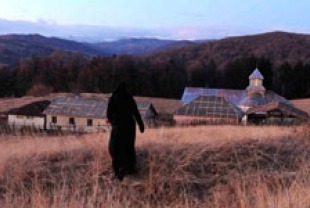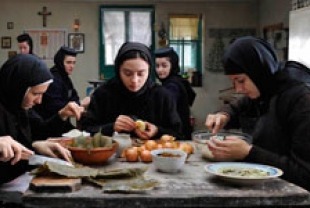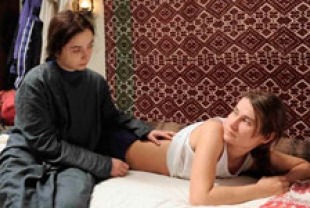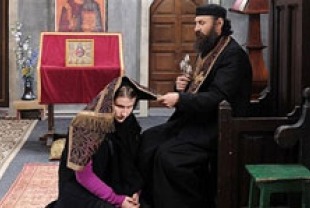Christianity goes astray when the zealousness of faith leads to human suffering rather than healing and wholeness. Throughout history rigid beliefs and an "us versus them" approach to strangers and those outside the community have undermined the central Christian practices of love, compassion, forgiveness, and hospitality.
In Beyond the Hills, writer and director Cristian Mungiu (4 Months, 3 Weeks and 2 Days) presents a laser-sharp portrait of a Christian community that has gone far away from these central spiritual practices and chosen instead to enthrone those which lead to greater human divisiveness, conflict, and pain. This is a hard film to watch but those who stay with it are sure to enlightened by its spiritual messages and meanings.
Alina (Cristina Flutur) and Voichita (Cosmina Stratan) grew up together in an orphanage and became close friends. Their relationship then evolved into a passionate love for each other. After working abroad in Germany, Alina decides to visit Voichita who has changed her life drastically by becoming a novice at a monastery. It is located in a desolate place and consists of a chapel and a few buildings without water or electricity.
The Romanian Orthodox priest there (Valeriu Andriuta) is a former power plant worker whose life was turned around by an encounter with an angel. He is a rigid, dogmatic, and authoritarian man who insists that the young nuns address him as "Father" or "Papa." As the leader of the community, he has no tolerance for nonbelievers.
Alina cannot wait to resume their sexual relationship but Voichita no longer wants to continue on that path. She has a new allegiance to God and to the priest who has emphasized how important it is to stay away from those who have lost the true faith. When her friend spurns her advances and refuses to leave for Germany with her, Alina plunges into depression and tries to commit suicide. After recuperating in a hospital, she returns to the monastery but continues to battle with the priest and to frighten the nuns with her violent outbursts.
All of this conflict weighs heavily on Voichita's soul. She watches helplessly when it is determined by the priest and the nuns that Alina has been possessed by the devil and needs an exorcism. At one point, the nuns read a list of 464 sins outlined by the Orthodox Church in an attempt to get her to repent.
Beyond the Hills is based on material written by journalist Tatiana Niculescu Bran's about real events in a Moldavian monastery less than a decade ago. In the dramatic finale, the unyielding and chauvinistic priest shows some humanity as he wrestles with his conscience and experiences moments of doubt.
Writer and director Mungiu refuses to capitulate to the universally popular descent of so many filmmakers into dualism where all the blame is placed on one malevolent and demonic person. Beyond the Hills ought to lead all spiritual people to a re-investment of their time and energies into the practices of love, compassion, forgiveness, and hospitality.
Screened at The 50th New York Film Festival: September/October 2012.



